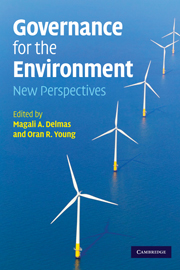Book contents
- Frontmatter
- Contents
- List of figures
- List of tables
- List of contributors
- Preface
- PART I Central threads and analytic perspectives
- Introduction: new perspectives on governahnce for sustainable development
- 1 Governance for sustainable development in a world of rising interdependencies
- PART II Governance for solving environmental problems: perspectives from economics, political science, and management
- PART III The effectiveness of governance for sustainable development
- PART IV Conclusion
- References
- Index
1 - Governance for sustainable development in a world of rising interdependencies
Published online by Cambridge University Press: 05 June 2012
- Frontmatter
- Contents
- List of figures
- List of tables
- List of contributors
- Preface
- PART I Central threads and analytic perspectives
- Introduction: new perspectives on governahnce for sustainable development
- 1 Governance for sustainable development in a world of rising interdependencies
- PART II Governance for solving environmental problems: perspectives from economics, political science, and management
- PART III The effectiveness of governance for sustainable development
- PART IV Conclusion
- References
- Index
Summary
Introduction
Governance, treated as a social function centered on efforts to steer or guide societies toward collectively beneficial outcomes and away from outcomes that are collectively harmful, is one of the great issues of every era. Thomas Hobbes, writing in the midst of the civil strife and turmoil of mid-seventeenth-century England emphasized the need to establish and maintain order (Hobbes 1660/1999). He assumed that individuals would engage in a struggle for power, concluded that life in the absence of effective regulatory arrangements would degenerate into a war of all against all, and called for the adoption of a social contract granting far-reaching authority – and the capacity to exercise it – to a central government. Writing during a period of political reform and economic prosperity in the second half of the eighteenth century, Adam Smith took a different tack (Smith 1776/1937). He started from the premise that individuals seek to enhance their own welfare and counted on the operation of the market to solve many coordination problems. Nevertheless, he assigned to governance the role of providing a stable system of rights and rules needed to allow commerce to flourish and to avoid or manage business cycles and financial fluctuations. Approaching these issues in the aftermath of the imperial wars that dominated European politics in the early years of the nineteenth century, Peter Kropotkin emphasized the dangers arising from the actions of powerful governments and came to believe in the virtues of anarchy (Kropotkin 1902/1986).
- Type
- Chapter
- Information
- Governance for the EnvironmentNew Perspectives, pp. 12 - 40Publisher: Cambridge University PressPrint publication year: 2009
- 11
- Cited by



